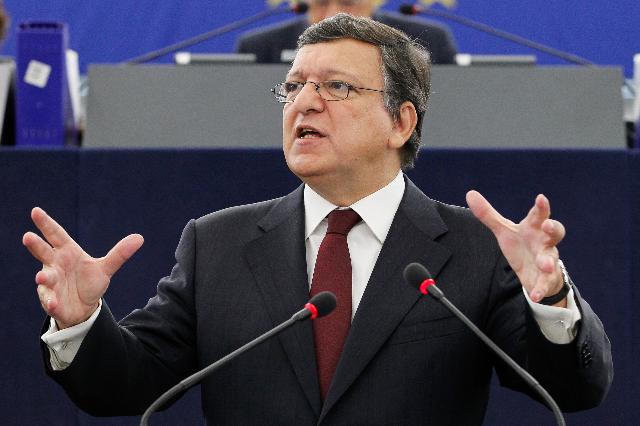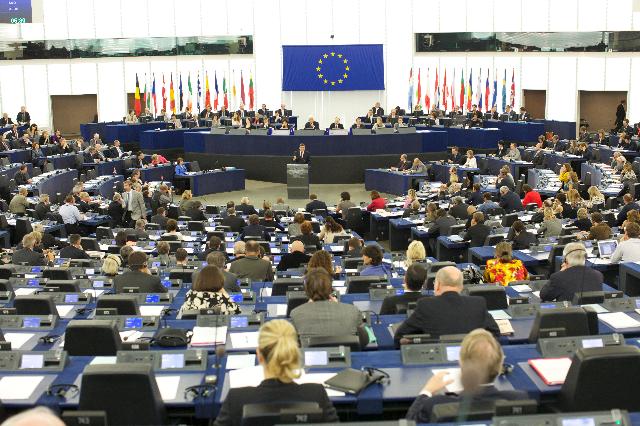The Different Reaches of Barroso’s Speech
One man – one speech but different angles all over Europe. The EU Commission president Jose Manuel Barroso held his yearly State of the Union on the 28th of September. And the media coverage about his statement has had diverse reactions all over the Europe. Some countries’ newspapers like Greece, Italy and Belgium have positively written articles. But in UK the pens of the journalists were switched to knives. Let’s start with what the papers in Germany had to say about it.
By Evelina Bergström, Thomas Pickelner and Ieva Sliziute
“The EU wants to limit gambling on the stock market!” That was the headline about the speech in the biggest newspaper of Europe, the German Bild. Except for the main focus, the Tobin taxes, the article also has some influence of German angles such as, “Especially under pressure fromGermany and France Brussels discussed the gambling tax”.
At the end of the article, the angle changes into dealing more with Barosso’s eagerness to get more power into the commission. A power battle that, among other aspects, is present in Barroso opposition to an economic government and calling for a revision of the EU treaty. The Bild author writes that Barroso did not even mention the Merkel and Sarkozy request for a financial goverment. But that he rejected the increase of more EU institutions.

Barroso convinced France and Belgium media. © European Union, 2011
France and Belgium take the lead on integration
Filling a whole page, under the headline “Barroso points out the importance of the Community method”, French La Tribune has an explicit angle. Starting with pointing out that MEP and Barroso oppositionist Daniel Cohn-Bendit could not keep himself from bursting into applause, the author continued to embrace MEP Guy Verhofstadt’s statement that the Commission must realize that the intergovernmental method is obsolete – the EU should move up to a level of higher integration.
With quite a similar spirit of satisfaction over plans of deeper integration, as La Tribune, Belgian La Soir also quotes Guy Verhofstadt. The headline “Barroso shows his claws and convinces”, is followed by the article’s descriptions of Barroso’s impressiveness, cleverness and high political skills.
Financial focus in Spain, impartial angle in Portugal
In Spain the angles of his speech were widely different. But two of the biggest newspapers El Mundo and El Pais had focused on the proposition Barroso had in his speech about implementing financial taxes also called the Tobin tax. Their articles pointed out why the commission wants to introduce the tax and what affect it could have in the EU. Also El Pais had an opinion piece with the headline “The Commission acts”.
The writer is critical about how the leaders of the EU had handled the situation so far and that it was good that the commission had finally taken action. “Barroso’s intervention before the European Parliament has been this is one small example of realism in the doldrums of blunders and useless rhetoric that has characterised the management of the crisis in the eurozone lately.”
Portugese Público is in counterpart to pre-chewed, pro-integration articles of La Tribune and La Soir, objective. By virtual and different points of views, Publico balances a rather objective summary of Barroso’s speech. The only signs of sides taking is the picture of Barroso raising his hand, the substantially center fold placing and the headline “Barosso promises to boost further integration of Euro.”

Media coverage in different countries focused on various points of the speech. © European Union, 2011
Increased enthusiasm in Greece and Italy
The Greek future has got potential. At least according to the Greek Kathimerini on the 29th of September 2011. The front page article “Relief after EU support” is followed up by reporting on how the Troika is moving towards a settlement. Greece-enthusiasm and positivism is though rather domestic – than pan-European. Barroso’s verification thatGreece is and will continue to be a part of the Eurozone is given none, or only vague interest in remaining papers.
Italian newspapers, such as Il Riformista, Il Tempo and Libero are positive and unconditionally take Barroso’s side. Il Riformista states that Barroso indicates ‘good basis’ as the cornerstone of a successful Financial Governance, but Berlin and London are against. Although slightly worried about new taxes, the mood remains quite calm. However, the newspaper Il Sole is rather dramatic. Under the headline “The way Barroso can lead us out of the ford” the author says: “The State of the Union speech [...] has made it possible to know the Commission’s guidelines to overcome this difficult situation” and that “nobody, not even strongGermany, may be able to deal with challenges of economic competition increasingly internationalized.”
UK interpret a never closer union
Even though the speech of the president of European Commission did not attain a lot of attention in the UKmedia, there are opinion articles and analyses, which show that the mood there is different: more critical, unfavourable, and even cynical. Adrian Hamilton in his article in The Independent says: “It’s no good talking, as the Commission President José Manuel Barroso, did in his state of the union address yesterday, of the solution being an ever more integratedEurope with common economic governance.” Moreover, he states: “There is no faith in the EU as an institution and certainly not in the idea of greater integration.”
Nevertheless, British politicians and business groups have reacted angrily to the proposals made by Barroso, and the speech was mentioned a lot more after Chancellor George Osborne pronounced strictly against a “Tobin tax”, which was called “Robin Hood tax” in The Scotsman. The Guardian printed the article called “Never closer union”, which says: “Mr Barroso won a warm hearing at the European parliament; beyond its walls, things are trickier. The EU is handicapped by the lack of an identifiable figurehead.” Stories Barroso vs. Osborne were much more popular and not hide at the end of the newspapers, but were placed in the first few pages.